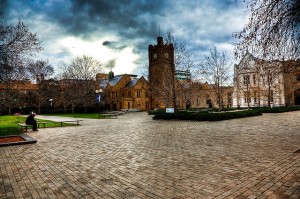A range of new facilities aimed at boosting the research and development efforts of Australia to reduce greenhouse gas emissions will be built, maintained and operated by The University of Melbourne.

Image credit: flickr User: Justin Kim
The $18 million contract between the Cooperative Research Centre on Greenhouse Gas Technologies (CO2CRC) and The University of Melbourne was announced yesterday as part of the $86 million CCSNET project established between CO2CRC and the Commonwealth Department of Education in August 2013 under the Education Investment Fund (EIF) for large-scale CCS Flagship projects. The EIF is providing $51.6 million.
According to the media release by CO2CRC, the new labs will support national and international efforts to boost CCS (Carbon Capture and Storage) as a technology for tackling climate change.
“With support from the CCSNET project, the University of Melbourne is able to make a significant contribution to advancing CCS technology. The University aims to become a world leader in developing innovative and more cost efficient CCS methods and, more broadly, establish Australia as a world leader in the technology. This investment will allow us to make great strides toward this goal,” said University of Melbourne’s Deputy Vice-Chancellor (Research), Professor James McCluskey.
“The Commonwealth funding is important for building new capability in CCS through a network of field facilities, onshore and offshore monitoring systems and world class laboratories. CCS is the only technology that can achieve substantial cuts in emissions from industrial-scale use of fossil fuels. So as the need for action on climate change becomes more pressing, Australia must be ready to deploy CCS technology,” said CO2CRC CEO Dr Richard Aldous.
CCSNET is mainly focused on supporting Victoria’s CarbonNet Project, funded under the CCS Flagships program “which enables demonstration of large-scale integrated CCS projects in Australia, with the aim of widespread deployment of the technology from 2020.”
“The University of Melbourne’s new infrastructure will benefit all CCS projects and, through improved processes and lower costs, increase the momentum for its global implementation,” Dr Aldous said.



















